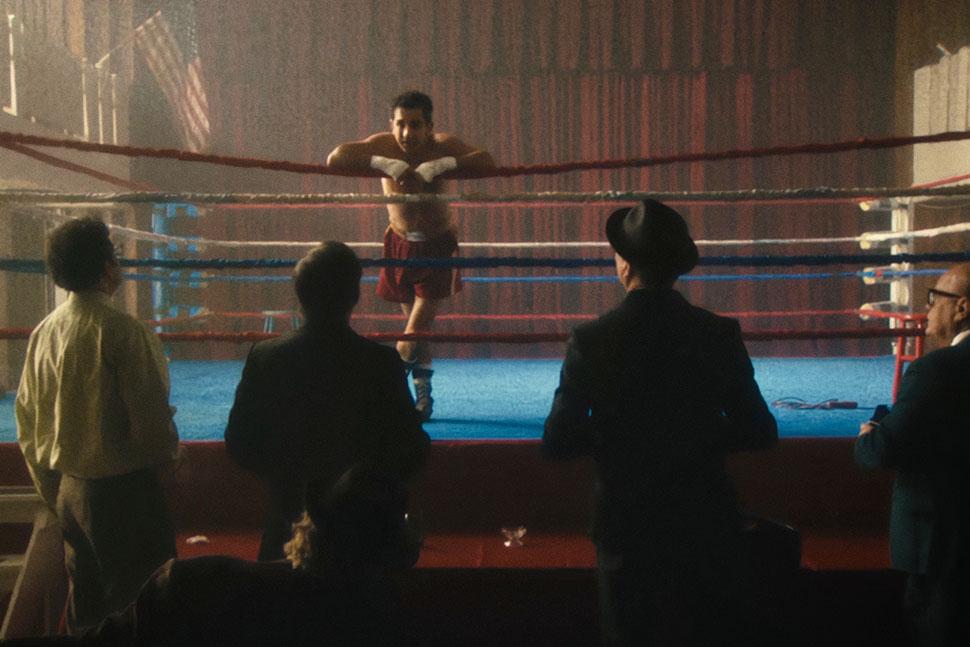The boxing film genre has been a staple of cinema since its inception — each filmmaker tackling these movies bringing a new perspective to the genre. John G. Avildsen gave us the iconic “Rocky.” Martin Scorsese painted a decades-spanning portrait in “Raging Bull.” Ryan Coogler modernized the genre with “Creed.” And, with his feature film directorial debut “The Featherweight,” Robert Kolodny peels back the curtain on the legendary Willie Pep and cements his place in the cinematic canon.
“The Featherweight” follows one of the most successful boxers of all time, Connecticut native Willie Pep (James Madio), who retired after 241 fights with 229 wins. The film recounts Willie’s riveting personal and professional life in 1964 as told from the perspective of a staged documentary camera crew. Too stubborn to accept a desk job, Willie plots his return from retirement to the ring. Along the way, the 42-year-old Willie butts heads with his 20-something wife and aspiring young actress Linda (Ruby Wolf), his drug-addicted son Billy Jr. (Keir Gilchrist) and his no-nonsense agent Bob (Ron Livingston).
As much as “The Featherweight” is a boxing movie, only a handful of scenes take place inside the ring, and many are presented in flashbacks. The focus is instead on Willie’s relationships with those around him. We’re given a window into Willie’s marriage: a cheery, untroubled union on the surface, but ultimately, one between two fundamentally different people. The film shows us everything from an intense argument scene in the couple’s TV room to an intimate moment where they share a kiss in the early morning.
A rich family drama, “The Featherweight” insists upon showing us uncomfortable parts of Willie’s life, an insistence that’s conveyed by Kolodny’s precise direction. With his background in cinematography, he’s able to direct in a unique way, with more personality than one would expect from a boxing film. Kolodny draws on his experience filming documentaries like “All the Beauty and the Bloodshed,” an expert analysis of activist Nan Goldin’s fight against the opioid epidemic as well as the stigma surrounding the LGBTQ+ community during the AIDS epidemic. Much of the previous film consists of rugged, character-centric footage, which Kolodny recreates in a narrative format for “The Featherweight.” The cinematography of “The Featherweight” is shaky when we’re on the move and full of close-ups when the actors are speaking directly to the camera.
In a captivating one-take scene, Willie tells the camera crew to wait outside a bar as he journeys inside to the bathroom to fetch his overdosing son. Naturally, the camera crew follows him anyway, and we’re faced with a stomach-churning two minutes as the camera hangs back just enough to hide from Willie. When we’re shoved into Willie’s life in moments we’re clearly not meant to see, we form a parasocial bond with him — we see the good, the bad and a fair share of the ugly.
“The Featherweight” would not work without its show-stopping central performance from James Madio. Appearing in nearly every scene of the film, Madio commands the screen. He’s everything you’d expect an Italian-American boxer reliving his glory days to be: charismatic, witty and obstinate to a fault. But Madio also delivers vulnerability that allows us to empathize with Willie, even though we might not agree with his every action.
“As an actor, you’re always looking for something to chew on,” Madio said in a Q&A. “I tried to stay in Willie’s world as much as possible.”
Ever so much Madio’s equal is Ruby Wolf, Tisch School of the Arts alum, who portrays the ditzy yet impassioned Linda. Despite this being her first feature film role, her confidence as an actress shines through, and her chemistry with Madio is off the charts. The couple’s playful dynamic is underscored by a sense of incompatibility and growing tensions.
“[The other actors] all brought so much careful research and so much information to every scene,” Wolf commented. “I would try to offer something in return. That’s what was so joyful about the process.”
“The Featherweight” captures lightning in a bottle. The right director found the right cast to tell a compelling and poignant story about the inevitability of change, the weight of masculinity and what it means to be a fighter, all with a level of authenticity that’s hard to find these days. Perhaps nothing will come close to old boxing films, but this one reinvigorates the genre with its combination of fresh, purposeful direction and emotionally resonant performances. Suffice it to say, “The Featherweight” is certainly worth your time.
Contact Leo Field at [email protected].

























































































































































